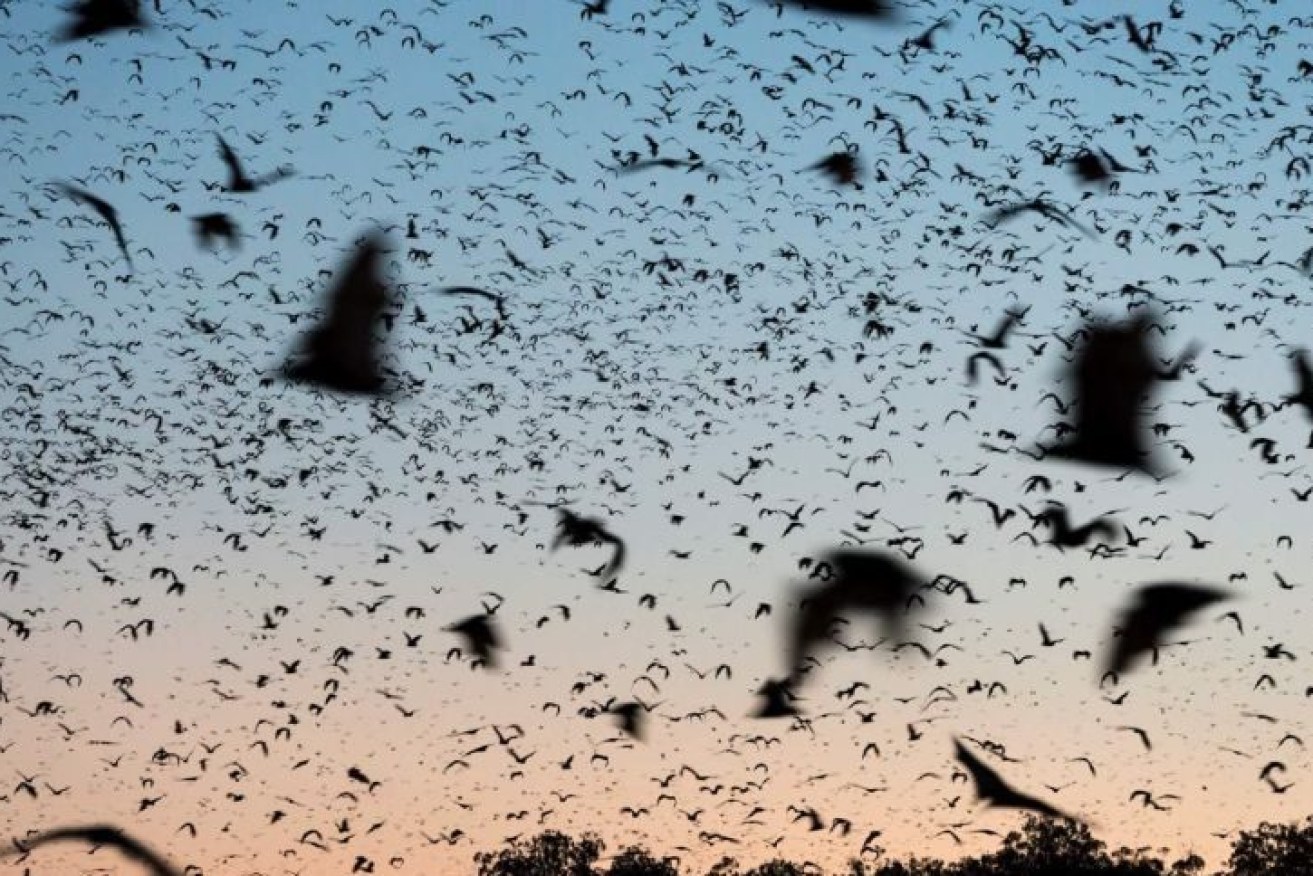Deadly bat-borne disease fears as lyssavirus case confirmed in Cairns
A little red flying fox found in suburban Cairns has tested positive for the lethal, rabies-like lyssavirus — just as bat activity booms during breeding season.

Hundreds of little red flying foxes leave their roosts - Gold Coast authorities have issued a health warning. (Photo: Supplied: Jurgen Freund)
A Biosecurity Queensland laboratory test has confirmed a case of lyssavirus in a bat found in the state’s far north as health authorities report a surge in flying fox bites and scratches.
The ABC understands the little red flying fox was found in suburban Cairns and euthanased by a local wildlife carer who then sent the animal to Brisbane for testing.
Biosecurity Queensland principal veterinary officer Dr Janine Barrett confirmed this was the third infected bat discovered in 2020 following a single case of Australian bat lyssavirus (ABLV) last year.
“It’s at the low end and the temptation is to think there’s less of it around this year, but that’s not really true,” she said.
“The numbers, frankly, reflect far more about what people are doing — whether they’re out and about where bats are, whether they’re finding bats that should be tested.”
Barrett said the numbers of infections tended to fluctuate wildly, with as many as 20 cases detected in years when awareness campaigns were heavily promoted.
ABLV infection in humans causes a serious, rabies-like illness that can result in paralysis, delirium, convulsions and death.
Since 1996 three people have died in Queensland due to ABLV after they were bitten or scratched by bats.
Barrett said access to vaccines and public health campaigns highlighting the dangers of handling bats had resulted in only one death over the past two decades — that of an eight-year-old boy from north Queensland in 2013.
“It’s quite rare,” she said.
“But unfortunately, once you do get sick, the outcome is usually pretty bad.”
A timely warning
The Cairns and Hinterland Health Service has reported 38 people presenting to health services with bites and scratches across the region since the start of the year.
Public health medical officer Dr Annie Preston-Thomas said numbers had surged over the past few weeks, which coincided with the breeding season.
“Around this time of year, it really picks up,” she said.
“It’s definitely a time of year when there’s more bats around in the urban areas.
“Our public health nurses have been saying every day there’s been a new call.”
Preston-Thomas said most of the injuries occurred because of people trying to help bats in distress.
“We would urge you, don’t try and rescue the bat yourself,” she said.
“Call the people with the right training and the right protection and they can deal with it.
“If somebody gets scratched or bitten by a bat carrying ABLV … they can get extremely unwell and even die.”
Virus deadly to bats
Dr Annabelle Olsson, a Cairns-based vet who specialises in wildlife care, says the discovery should not necessarily be cause for alarm, given how lethal ABLV is to the animal itself.
“Bats don’t carry lyssavirus — if they become infected, they die,” she said.
“There’s no carrier state, so they can’t shed it around the place while they’re still healthy.
“From the time they first would become infectious to somebody until the time they die is as little as 24 to 48 hours.
“It’s not a disease that will run rampantly through an entire community — lyssavirus in bats is more likely to be isolated to one, or possibly a small cluster that are closely hanging together.”
Olsson said while small numbers of bats might fall victim to ABLV, many more were dying due to the impacts of humans.
“In the last 12 months I’ve probably treated or had to euthanase up to 1,000 bats that have been injured from flying into buildings or being hit by cars in the CBD,” she said.
Olsson also stressed the importance leaving bat handling to the experts.
“When it comes to bats, you should be up to date with rabies vaccinations and be regularly checking your antibody titers, and also be a thoroughly trained bat handler before you go anywhere near a bat,” she said.
“The clear message is – as with any wildlife – that people who aren’t familiar with bats shouldn’t be handling them.”
– ABC / Brendan Mounter and Adam Stephen












